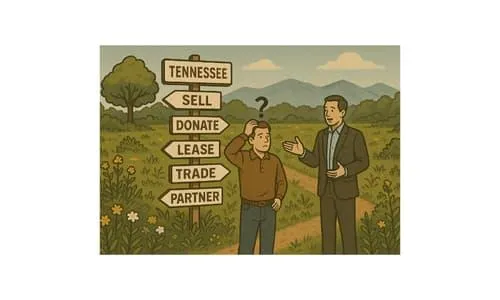
Unwanted Land in Tennessee? Options You Didn’t Know Existed
Owning land in Tennessee is often seen as a valuable asset. It holds the promise of future development, a quiet retirement getaway, or an inheritance meant to be treasured. But what happens when that land becomes more of a liability than a blessing?
For many property owners, land that once represented opportunity has turned into a financial burden and a source of stress. Whether you inherited a parcel you never asked for, purchased a piece of land with big plans that never materialized, or simply find yourself stuck with property you don’t want or can’t manage—you're not alone.
The good news? You’re not without options. In fact, there are more ways to deal with unwanted land in Tennessee than most people realize. And some of those options might just surprise you.
The Hidden Costs of Holding Onto Land
Unwanted land doesn’t just sit there harmlessly. In most cases, it quietly drains your resources over time. The most obvious cost is property taxes, which continue to accumulate year after year, whether or not you’re actively using the land.
But there are other hidden costs, too. Even vacant lots require upkeep—think overgrown weeds, trees encroaching on neighbors’ property, or even illegal dumping. Depending on where the land is located, you may be responsible for local ordinance violations if it's considered an eyesore or hazard.
And then there’s the emotional toll. For many people, especially those who’ve inherited land from a loved one, there’s a heavy sense of obligation and uncertainty. One woman, Carla S., inherited a property in rural Tennessee from her uncle. She’d never seen it in person and didn’t have the means to maintain it, but she felt guilty just walking away.
“It was such a relief to have the burden lifted when I finally sold the land,” she said. “The process was quick and stress-free—I just wish I had known about the option sooner.”
Why People Hold Onto Land They Don't Want
Carla’s experience is not unusual. Many people hang onto property for years simply because they’re not sure what else to do. There’s often a sense that selling raw land must be difficult or that there’s no real market for it.
Some people believe a realtor is necessary to make a sale and assume they'll need to invest in marketing, cleanup, or even legal fees before anything can happen. Others hang on out of sentimental attachment, hoping the property might one day be useful or valuable. And for many, it’s just about not having the time or energy to deal with it.
But that inaction can have consequences. Holding land that no longer serves you can lead to financial strain, missed investment opportunities, and continued emotional stress. Fortunately, you don’t have to stay stuck.
A Fresh Start: Real Solutions for Unwanted Land
So what can you actually do with unwanted land? You have more choices than you may realize—and the right solution depends on your goals, timeline, and comfort level.
One increasingly popular option is selling the land directly to a professional land buyer. These buyers specialize in purchasing land “as-is,” which means you don’t have to worry about cleaning it up, clearing titles, or handling back taxes. The process is usually fast, straightforward, and doesn’t involve realtors or lengthy negotiations.
Darren M. from Chattanooga found himself in a tough spot with his land. He’d fallen behind on property taxes and was starting to receive threatening letters from the county. “I tried to sell my land for months with no luck. Then I connected with Jenna, who bought it quickly, covered the taxes, and took care of everything. It was a huge weight off my shoulders.”
This kind of direct sale can often close in a week or two, depending on the situation. Trusted land buyers also handle the paperwork and closing process, often using mobile notaries or title companies, which makes it easy for owners who live out of state or have limited availability.
Selling isn’t the only path forward, though. Some landowners choose to lease their property instead. This is especially viable for agricultural land, hunting acreage, or timber-rich parcels. Leasing can generate passive income while still retaining ownership of the land.
That said, leasing isn’t completely hands-off. You’ll still be responsible for property taxes, maintenance, and managing the lease terms. For some, it can be a good short-term solution. But for others, especially those who want a clean break, a sale makes more sense.
Another option that’s often overlooked is donating the land. If you’re not concerned with turning a profit but would rather be free of the burden, donating your property to a nonprofit or land trust can be a powerful way to give back. Depending on your tax situation, it may also provide a deduction or financial benefit at year’s end. It’s a meaningful solution for people who care about the land’s future use but don’t want to hold onto it any longer.
Common Concerns (and Why They’re Usually Not a Problem)
A lot of people assume that their land isn’t worth anything or can’t be sold because of issues like back taxes, poor access, or legal disputes. But professional land buyers work with all kinds of property, including:
Landlocked parcels without road access
Vacant lots in rural or urban areas
Properties with tax liens
Inherited land stuck in probate
Zoning or title challenges
Shannon L., who sold her vacant lot in West Tennessee, said, “I was worried no one would be interested in my property because it was undeveloped and hard to reach. But I got a fair offer and the deal closed in seven days.”
That’s the key advantage of working with people who understand the local land market—they’re prepared to deal with complications that would scare off a traditional buyer.
Real Stories, Real Relief
Carla S., Darren M., Shannon L.—they all found relief by taking action. Whether they sold quickly for cash or finally let go of inherited land they couldn’t use, the sense of peace that followed was the same.
Another seller, AJ, shared, “I had owned my property for years but couldn’t afford the taxes anymore. Selling it gave me peace of mind and the freedom to move on.”
These stories are more common than you might think. And the people in them didn’t have special knowledge or connections—they just found the right help at the right time.
Moving Forward: What’s Right for You?
If you’re holding onto unwanted land in Tennessee, ask yourself: is it serving your goals, or just weighing you down? Whether you're looking to offload it for cash, lease it out, donate it, or simply explore your options, the most important step is taking action.
There’s no one-size-fits-all answer, but there is a right answer for your unique situation. And you don’t have to figure it out alone.
Need Help?
The process of letting go of unwanted land doesn’t have to be complicated or overwhelming. At Friendly Land Buyers, we’ve helped countless Tennessee landowners find clarity and peace of mind by offering personalized, pressure-free support.
Ready to chat about your land?
Call us directly at 888-912-3242 for immediate assistance.
Text us at 888-912-3242 for a quick response.
Click the chat icon in the bottom right corner to start a conversation now.
Our team understands what you’re going through and is here to walk you through your options—no pressure, no obligations, just helpful guidance from people who care.
Let’s turn that burden into relief—starting today.
Disclaimer: This guide provides general information and should not be considered legal advice. Please consult with a qualified attorney for specific guidance on your situation.

